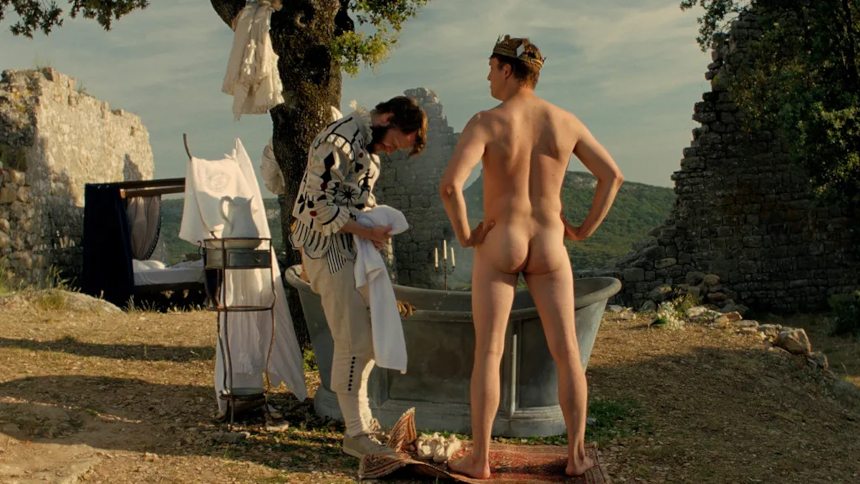Rotterdam 2024 Review: KING BABY Is A Royal Triumph
Kit Redstone and Arran Shearing have made a ballsy absurdist showpiece about ruling.

King Baby, by directors Kit Redstone and Arran Shearing, could've gone wrong in so many ways. The film is a send-up of masculine power plays, toxic machismo and the thin veneer of social niceties that hide volcanic violence waiting to burst. It is also more than just a film that tries to smash the patriarchy, it is tackling class struggle and the fallacies of monarchy and other political structures, too.
In King Baby, two men live all alone in the ruins of a castle. One is The King and one is The Servant. The Servant serves The King's every whim, but once complacency sets in, and The King starts having nightmares, it is time for a change. Perhaps a role reversal might help?
Next to being a very broad satire, that is thematically trying to do a lot, King Baby is deliberately limited in scope, focusing on just one location (the ruins of a castle) and a handful of characters (a king, a servant, and the wooden mannequin they call their queen). It's a tightrope walk, trying to tackle so many topics, and putting them all on the shoulders of just two actors, with no variation in setting whatsoever. This could've been a blunt-force bore.
King Baby is a triumph instead. None of it should work this well, as the dialogue on paper can come across as overwrought. The satire here is very broad, and lines like "that was a very galvanizing speech about jism and your belly button, Sire" could've gone over like a lead balloon.
So, why is King Baby not a disaster? Part of that has to do with the casting. Graham Dickson, who plays the king, straddles the line between pathetic buffoonery and charismatic pompousness perfectly, even finding grace notes later in the story. This film should be his calling card to every British comedy director out there, as in a just world this would be a star making turn.
Neil Chinneck, credited as The Servant, is as good as Dickson. There is also a slight patheticness to his character, that comes out increasingly as toxic behavior clad in big words and social niceties. This is a character who hides the fact he is as lost and morally bankrupt as the king by using his sharp wit and intellect.
The king and the servant, whose dynamics change over the course of the movie several times, therefore become symbolic of certain male behavioral stereotypes. Throughout the course of the movie The Nice Guy, The Pompous Asshole, The Violent Perpetrator and many more come by, in one form or another. But lest you think that King Baby is a moralistic message movie, there is too much nuance and thorniness going on for it to be taken as a screed. This is an incendiary movie that is heavily involved with portraying masculine power structures, and taking them down. But it is also a film that is often laugh out loud funny, incredibly silly, and quite imaginative.
The pacing is aces, for instance. This film wouldn't have sold half of its twists and turns as well, if the directors didn't know when and how to move things along. You never get the feeling of claustrophobia and isolation that eventually sets in with most one-location-films. The film never gets boring or complacent, as there is so much happening on screen. This is a film that has a lot to say, and says it well. The stripped-down approach in location and characterization is a brilliant choice, as it leaves room for the audience to keep tracking the dynamics between the two men over time. King Baby shows that a satire can be pared-down while having a lot to say. It also shows something can be wilfully silly yet thought provoking. Don't miss this one.







